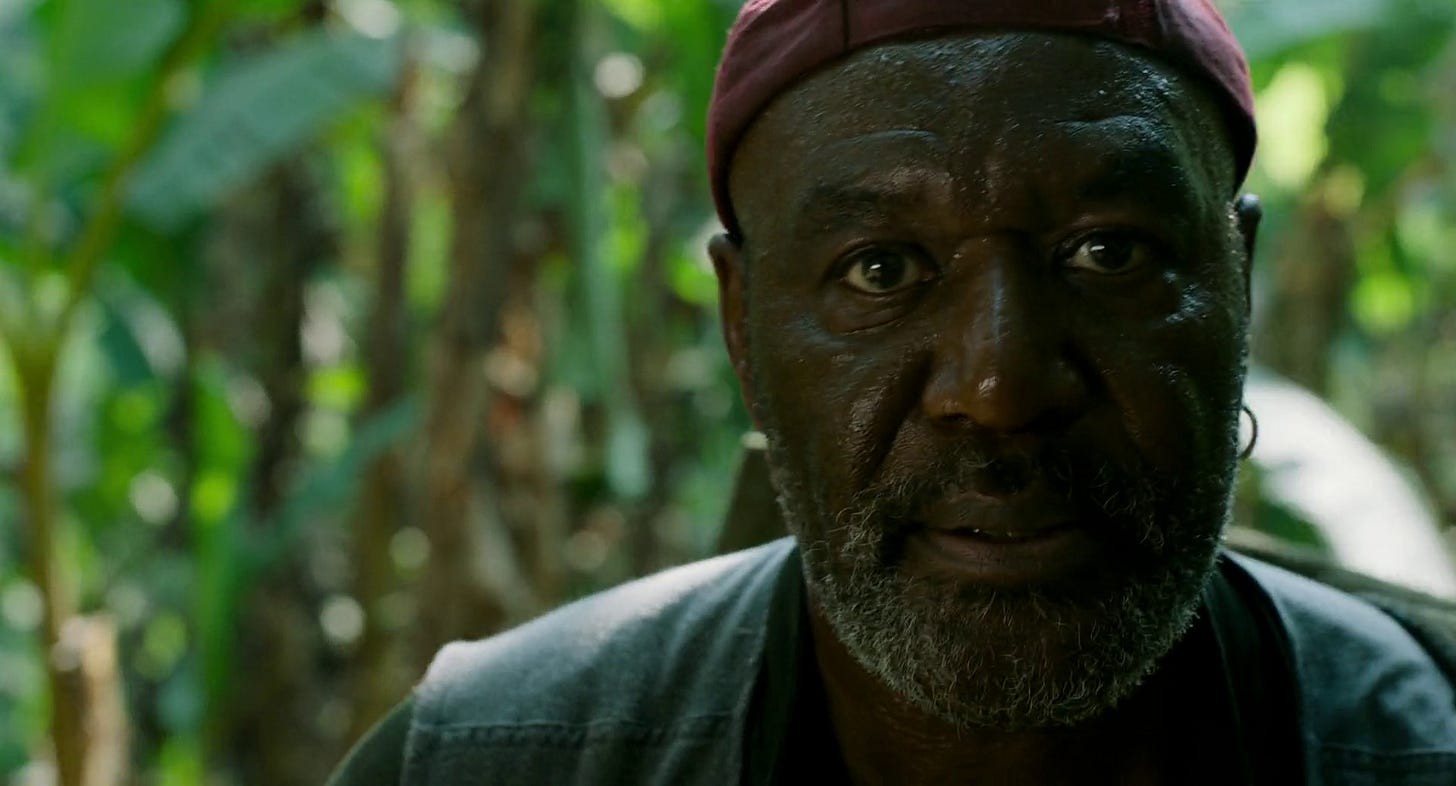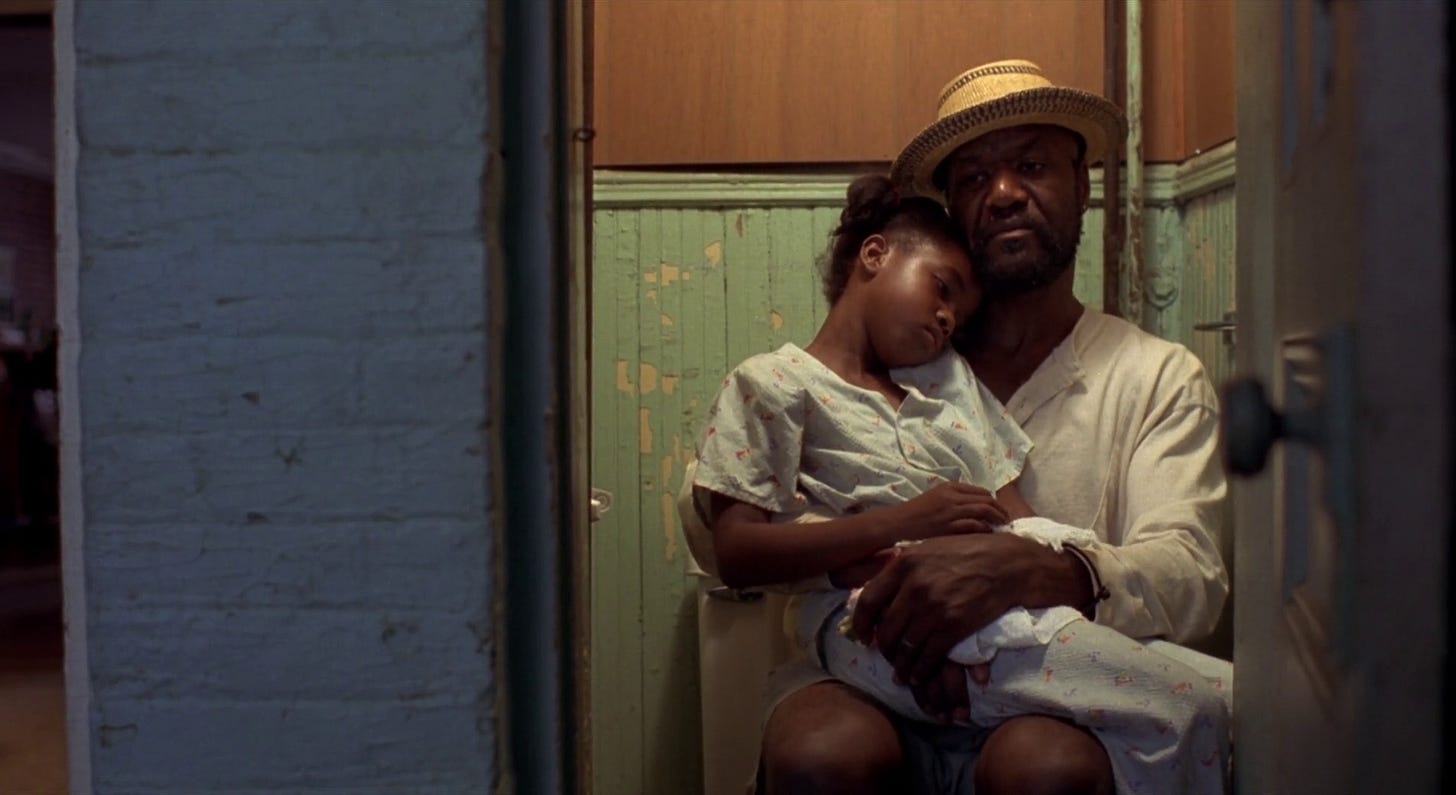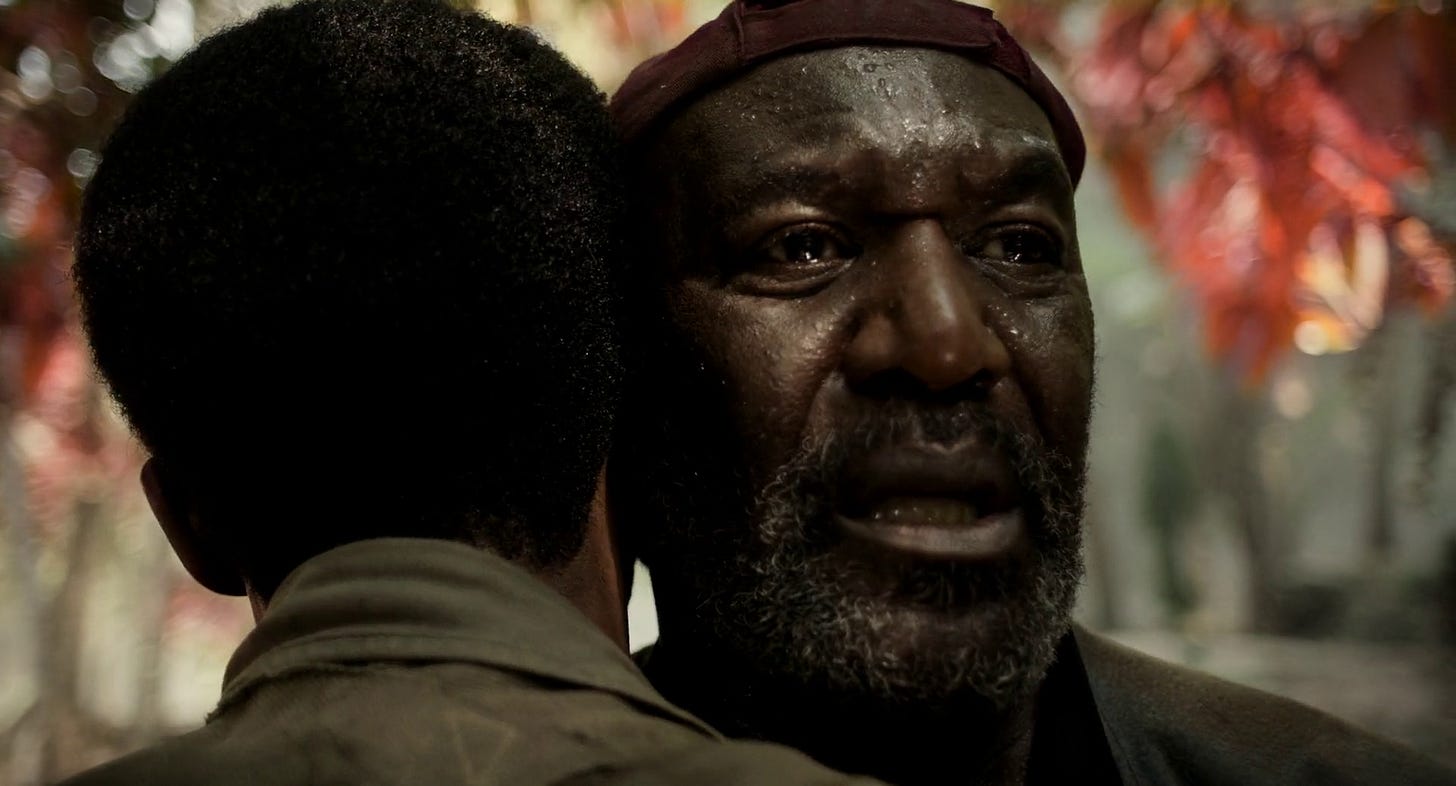"I'm the Motherfucker": Delroy Lindo and Spike Lee's creative partnership
The star and director of Netflix's DA 5 BLOODS have a long history together.
Receive all future Afterglow newsletters electronically by clicking the subscribe button. This is a free and public post so please forward. Thank you!

The following contains spoilers for Da 5 Bloods.
According to Delroy Lindo’s Paul, the tragically combustible soul of Spike Lee’s scathing war epic Da 5 Bloods (2020), life has never given him a fair shake. It makes sense, then, that in a heightened state of isolation, paranoia, and exhaustion toward the film’s riveting conclusion, he directly addresses the camera and demands equity in death.
“I will choose when and how I die. You dig?”
As a young soldier fighting in the jungles of Vietnam, he witnessed firsthand (and most likely committed) atrocities of combat. Upon returning stateside after serving three infantry tours, he was met with systemic disenfranchisement, public resentment, and brazen racism by a country whose very inception was based on such immoral pillars of inequality. Later, we find out Paul also witnessed the death of his beloved wife who succumbed during childbirth, leaving him with a baby son that would forever symbolize this painful memory.
With decades of unbridled rage and trauma bottled up, the chip on his shoulder has turned into a massive cinderblock. By the time he touches down in Vietnam again nearly five decades later, the weight of his pain can no longer be harbored in silence. When triggered, his racist anger shoots outward in every direction like the steel spheres from a claymore mine. Once an infallible ally to Black liberation, Paul’s ideological worldview has turned malignant; he now worships at the altar of America’s latest hateful religion, Donald Trump’s MAGA.
This isn’t something his friends and fellow “Bloods” - Otis (Clarke Peters), Melvin (Isiah Whitlock Jr.), or Eddie (Norm Lewis) - feel particularly comfortable addressing outside of classic male shit-talking. All of them firmly recognize the context and stakes of Paul’s slip into PTSD-fueled mania, but they have not come back to Vietnam for psychological closure or redemption. Instead, all four men have returned to retrieve a shipment of buried gold bars that, at the time, was meant to be delivered to local Vietnamese insurgents fighting the Viet Cong, and the body of Stormin’ Norman (Chadwick Boseman), the one Blood who never made it home.
Each Delroy Lindo character in Spike Lee’s movies have one thing in common: they have an almost preternatural need to be heard. As the gangster West Indian Archie in Malcolm X (1992), Lindo is cool personified, a successful immigrant hustler who prides himself on having an impeccable memory when it comes to running numbers. But underneath that facade is an unrepentant need to be respected.
Archie initially becomes a mentor to a young hothead criminal named Malcolm Little (Denzel Washington), a man who would eventually embrace the Nation of Islam in prison becoming one of the leading voices in staunch Black advocacy during the Civil Rights Movement. But before he was orating for the cause Malcolm learned the ropes from Archie, how to read a room, and carry a gun. The criminal underworld showed him how to command attention, but Archie gave him the tools to understand how that power can sway others in times of crisis.

When I think of Archie, I also think of Rodney Little, Lindo’s charming false prophet drug dealer in Clockers (1995). Both men present themselves as leaders of the people, but their intentions are always self-serving. Rodney’s only concerned with survival, not to mention furthering a continuous cycle of crime that uses young Black men as pawns who carry the emotional and legal burden in his stead.
Rodney was once one of those young men himself. During a showstopping scene, he recounts the first time he was forced to kill someone to his young protege Strike (Mekhi Phifer), right before asking him to do the same. One moment Rodney can be fatherly and loyal, and the next he’s shoving a gun down your mouth. Lindo imbues his character a sense of nervous anxiety while embodying both sides of the tonal spectrum.
As Lee’s film unfolds in rapid bursts of shifting narrative perspectives, NYC cops (Harvey Keitel, John Turturro) and Strike’s fellow drug dealers try to figure out if he was responsible for killing a fast-food chain manager. But Lindo’s Rodney could care less who pulled the trigger, just how the consequences of that act will ripple outward and impact his business.
Spike Lee is a great filmmaker, but he may even be better at casting actors. Lindo’s role as the kind, hard-headed musician father in Crooklyn (1994) feels perfectly suited to the actor’s many strengths. Unlike the gangsters in Malcolm X and Clockers, his Woody Carmichael is a good man at heart. He’s been a steadfast and loving father to his five children, and a loyal (if not maddening) husband to wife Carolyn (Alfre Woodard).

Still, there’s an infuriating stubbornness to Woody that fits nicely with Lindo’s other characters in Lee’s filmography. One of the film’s greatest scenes features an argument between Woody and Carolyn over his resistance to playing other people’s music, namely doing rock ‘n roll covers, despite the fact that it’s hurting their family financially. Clearly he would do almost anything to support his family, but this is where the artist in him draws the line.
Set in the 1970s, Crooklyn features wall to wall music. It’s a wonderful jukebox nursery rhyme of sorts told through the eyes of Troy (Zelda Smith), the youngest Carmichael, and Woody’s only daughter. So it’s quite ironic that the musically conservative Woody lives in a fictional world that often feels consumed by upbeat pop songs.
Lindo’s characters in Da 5 Bloods, Clockers, and Crooklyn are all fathers struggling with various degrees of panic over the pressures of responsibility. Their anxiety correlates with the tension many parents come to experience, the battle between personal expression and paternal sacrifice. Woody’s pain is subtle and genuinely heartbreaking, while Paul’s is the most overtly incendiary and memorable.
In Da 5 Bloods, which is a brilliant reckoning aimed at seeing the legacy of American history through the eyes of Black characters, Paul walks through each scene as if he’s about to hit a tripwire or step on a landmine. While Otis, Melvin, Eddie, and his son David (Jonathan Majors) are focused on getting the gold, Paul’s mind has never really retreated from the last combat mission that took Norman’s life. “I see ghosts, y’all,” he finally confesses, but that doesn’t come close to explaining the layers to his mental state.
Like Rodney, Paul’s mood fluctuates extremely based on the circumstances at hand. In a lovely moment of shared solidarity and friendship, he leads a rendition of Marvin Gaye’s “What’s Happening Brother” while the group walks through the jungle on their way to the burial site. But later, when their scheme is threatened by the arrival of outsiders, Paul’s demeanor turns stone cold. In a clear sign of dominance, he looks everyone in the eyes, both friend and perceived foe, and screams, “I’m the motherfucker! I am the motherfucker!” He repeats that phrase two more times for effect.
Throughout Da 5 Bloods, Lee cuts away to archival photographs of important Black historical figures (everyone from Crispus Attacks to Milton L. Olive, III) whose actions are paramount to understanding the complex ways in which America’s legacy has been shaped by multitudes of Black experiences. In that sense, the film offers a sharp but effective critique of almost every Vietnam War film that has ignored these stories, even going so far as to use Wagner’s “Ride of the Valkyries” for a peaceful boat ride into the supposed “Heart of Darkness.” Fuck you, Francis Ford Coppola!

And yet none of this really matters to Paul, despite the fact that his story is of equal importance. He is a broken character no one has ever deemed worthy of fixing. He is mired with guilt, self-pity, and regret. He is the lone gunman. He is Spike Lee’s Kurtz. But he’s also a father, a brother, a Blood, an American.
I can’t imagine anyone else playing Paul other than Delroy Lindo, who was born in Southeast London and lived in Canada for a time before moving to the U.S. He seems to understand better than any living actor what it means to be an American consumed by self-delusion and self-importance. To feel that my pain hurts the most, that my trauma is the most damaging. That my situation is most dire. That my country is the best. That I don’t need science. That I don’t need to wear face masks. Damn skippy.
Paul is what happens when that way of individualized, radicalized thinking has been left unattended for years, festering in the hate and anger spewed by Fox News and right-wing politicians, seeking salvation from the ultimate zealot, and finding only more of the same pain. Paul’s black hole energy eventually becomes too much for Da 5 Bloods, and Lee sends him on a different path. There he finally finds the space to reconcile with his demons, and give us the fire and brimstone sermon that’s been waiting to burst out ever since the opening scene.
After Paul’s spoken word requiem, Da 5 Bloods ends with another powerful address, this time from Dr. Martin Luther King, who powerfully quotes Langston Hughes’ “Let Amerca Be America Again.”
“America was never America to me,
And yet I swear this oath— America will be!”
Spike Lee and Delroy Lindo have brought the essence of Hughes’ sentiment to life through Paul, an accidental apostle whose words are earthquakes we cannot easily shake.
——————————————————————————————————————
Where to Watch
Crooklyn - Amazon VOD
Clockers - Amazon VOD
Da 5 Bloods - Netflix
Malcolm X - Netflix
——————————————————————————————————————
Until next time,
GHJ

